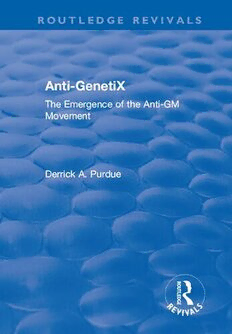
Anti-GenetiX: The Emergence of the Anti-GM Movement PDF
Preview Anti-GenetiX: The Emergence of the Anti-GM Movement
ANTI-GENETIX Anti-GenetiX The emergence of the anti-GM movement DERRICK A. PURDUE First published 2000 by Ashgate Publishing Reissued 2018 by Routledge 2 Park Square, Milton Park, Abingdon, Oxon, OX14 4RN 711 Third Avenue, New York, NY 10017, USA Routledge is an imprint of the Taylor & Francis Group, an informa business Copyright © Derrick A. Purdue 2000 All rights reserved. No part of this book may be reprinted or reproduced or utilised in any form or by any electronic, mechanical, or other means, now known or hereafter invented, including photocopying and recording, or in any information storage or retrieval system, without permission in writing from the publishers. Notice: Product or corporate names may be trademarks or registered trademarks, and are used only for identification and explanation without intent to infringe. Publisher's Note The publisher has gone to great lengths to ensure the quality of this reprint but points out that some imperfections in the original copies may be apparent. Disclaimer The publisher has made every effort to trace copyright holders and welcomes correspondence from those they have been unable to contact. A Library of Congress record exists under LC control number: 00132842 ISBN 13: 978-1-138-73892-8 (hbk) ISBN 13: 978-1-315-18447-0 (ebk) Contents List of Tables vii Preface ix Acknowledgements xiii List of Abbreviations xv 1 Genetic Patenting: Knowledge, Global Governance and the Anti-GM 1 Movement 2 Patenting Discourses: Enclosure and Expert Systems 15 3 Global Governance: Hegemonic Trips, Biotech and the WTO 41 4 The Counter-Expert Challenge: NGO Leadership in the 59 Anti-GM Movement 5 Cosmopolitan Networking: Counter-Experts and Global Civil Society 97 6 Global Civil Society and Global Governance: NGOs and the FAO 109 in Leipzig 7 Conclusion: Counter-Experts, Social Movements and Global Politics 133 Bibliography 145 Index 155 v List of Tables Table 1: Seed NGOs 60 Table 2: Anti-GM Frames 62 Table 3: Environmental Organizations 64 Table 4: The Anti-GM Movement 65 Table 5 : Collective Action Repertoires 66 vn Preface The origins of this book lie in an essay written for my MSc on Ecology and Society in the winter of 1992, testing John Rawls* theory of justice (Rawls, 1973) against the social and environmental implications of the General Agreement on Trade and Tariffs (GATT), for which I read an excellent book by Kevin Watkins on the inequities of the GATT (Watkins, 1992). This project then expanded into a MSc dissertation on seed patenting in the GATT (Purdue, 1993). The emphasis shifted to social movements and it continued to grow into a PhD thesis (Purdue, 1998). Three chapters have devolved into separate publications on social movement theory (Purdue, 1995b), a National Consensus Conference on Biotechnology (Purdue, 1996; 1999) and the neo-tribal identities of local seed savers (Purdue, 2000), leaving the core argument of the thesis in an updated and clarified form as this book. It was prompted by the emergence of two global issues - the patenting of life forms via biotechnology; and the global crisis of natural and agricultural biodiversity. The rationale for this book is to explore the emergence of a social movement in response to these issues by connecting three usually disconnected theoretical literatures on expert systems, global governance and new social movements, which can themselves benefit from being brought together. Thus the book is structured so as to develop these concerns through a case study. Chapter one introduces these empirical issues and theoretical frameworks and discusses the appropriateness of a case study of the anti-GM movement. Chapter two addresses the dominant discourse of intellectual property rights, as it traces the problematic application of patenting to genes and the consolidation of expert systems. I argue that the dual nature of a patent as a knowledge claim and a property relation binds together an economic drive to commodification and a rationalisation of knowledge into an expert system. Edible seeds may be owned not only as tangible property (food), but also as pure information (genetics). Intellectual property is both an expert system itself and the ownership of expertise in general. Intellectual property and expert knowledge are self-referential texts, but lay claims to universal applicability and priority over other knowledges. The new knowledge embodied in patents is new to that expert system and has to take the form of IX
